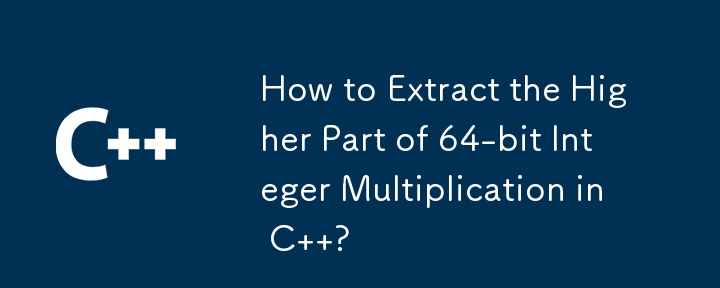如何在 C 中提取 64 位元整數乘法的高位元部分?
- Patricia Arquette原創
- 2024-11-14 09:38:02496瀏覽

Extracting the High Part of 64-bit Integer Multiplication
In C , multiplying two 64-bit intetic injg >) results in a value representing the lower 64 bits of the product. This operation is commonly used to achieve modular arithmetic, where the lower bits contain the desired remainder. However,有時候,我們也需要計算乘法的更高位部分。
最優方案考慮以下場景:
如果使用支援128 位元數字的GCC 編譯器,最有效的策略是執行128 位元乘法並提取高64 位元。uint64_t i = // some value uint64_t j = // some value uint64_t k = mulhi(i, j); // where mulhi() returns the higher part of the 64-bit multiplication無 128 位元支援時的替代方案
如果沒有 128 位元支援,可以使用 Yakk 提供的方法。這個方法將
a和 b 各分解為兩個 32 位數字,然後使用 64 位乘法分別計算這些較小數字的乘積。 分解如下:
現在,乘積可以表示為:uint64_t a_lo = (uint32_t)a; uint64_t a_hi = a >> 32; uint64_t b_lo = (uint32_t)b; uint64_t b_hi = b >> 32;但是,使用 64 位元對上述公式進行計算會產生溢位。因此,我們需要對中間結果進行特殊處理:
a * b = ((a_hi << 32) + a_lo) * ((b_hi << 32) + b_lo)
= ((a_hi * b_hi) << 64) +
((a_hi * b_lo) << 32) +
((b_hi * a_lo) << 32) +
a_lo * b_lo稍做修改,如果不在乎高位部分多 1,則可以省略進位位的計算。 // 为防止溢出而引入的临时变量
uint64_t a_x_b_hi = a_hi * b_hi;
uint64_t a_x_b_mid = a_hi * b_lo;
uint64_t b_x_a_mid = b_hi * a_lo;
uint64_t a_x_b_lo = a_lo * b_lo;
// 计算进位位
uint64_t carry_bit = (((uint64_t)(uint32_t)a_x_b_mid +
(uint64_t)(uint32_t)b_x_a_mid +
(a_x_b_lo >> 32)) >> 32);
// 计算高位部分并返回
uint64_t multhi = a_x_b_hi +
(a_x_b_mid >> 32) + (b_x_a_mid >> 32) +
carry_bit;
return multhi;以上是如何在 C 中提取 64 位元整數乘法的高位元部分?的詳細內容。更多資訊請關注PHP中文網其他相關文章!
陳述:
本文內容由網友自願投稿,版權歸原作者所有。本站不承擔相應的法律責任。如發現涉嫌抄襲或侵權的內容,請聯絡admin@php.cn

